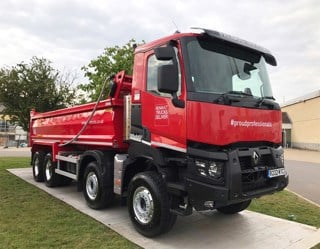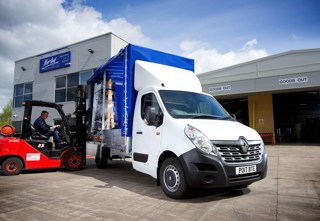Renault will launch integrated fleet management and predictive maintenance services this year and is continually evaluating its electric offering to stay ahead of the curve in the LCV market, Liam Campbell discovers.
In the UK, Renault has been traditionally seen as a car manufacturer that sells a few vans, but in mainland Europe the picture is quite different. The company has topped the European van sales table since 1998, with a market share last year of 15%, more than double its UK figure of 6.8%.
Renault established the Pro+ dealer network in 2009 to better address the needs and concerns of its LCV customers through experienced sales and aftersales advisors, a comprehensive range of demonstrator and courtesy vans, and extended opening hours for servicing.
That year, its market share leapt by more than a percentage point, from 5.35% to 6.5%, but has remained fairly static since.
In late 2015, Pro+ developed to become its own marque (although Renault’s vehicles are still branded with the same silver diamond), with a dedicated team working out of the company’s Paris headquarters. Its remit is to identify industry trends so Renault can adapt and change to meet future requirements.
Philippe Caillette (pictured), programme director for small vans at Pro+, believes Renault’s LCV success has largely been driven by offering affordable vans for trade and fleet customers, but he argues that this will not be enough to continue its success in future.
“Europe is an advanced market and the demands of the customers are changing, particularly in fleet,” says Caillette.
“With the creation of the Pro+ brand, we’re identifying these changes and responding as quickly as possible.
“We’re living in an increasingly complex and demanding world, which puts our customers under huge strains and our aim is to alleviate those. Some of the biggest challenges are related to urbanisation, for example emissions, and a lot of products and services that we’ve developed have been centred around that. But there are also other issues like operating costs, downtime, accountability and efficiency.”
As well as being the European leader for LCVs, Renault also heads the market for electric vehicles with more than 100,000 vehicles on European roads. The company has recently updated its small electric van, the Kangoo ZE, and will launch its second, the Master ZE, at the start of 2018. It also has the Twizy cargo van.
“The Kangoo ZE was launched six years ago and customer feedback has been fantastic, although some had highlighted that the charging times were long and the range was short,” Caillette says. “By collaborating with LG Chem in Japan, we’ve been able to offer a new battery and charger that cuts the charging time to six hours from eight and increases the range to 168 miles from 106.
“Diesel engines have been condemned by a number of politicians and organisations over recent years and prices frequently fluctuate which has led to a number of our customers, most notably the French postal service La Poste, to enquire about a larger electric van. We began talks with a number of fleets about the possibility of an electric Master, and there was a lot of interest.”
The Master ZE made its debut at the Brussels motor show in January, and has a 124-mile range, a 72PS/225Nm motor and between a 1,000kg and 1,100kg payload. When it finally hits Pro+ dealerships in 2018, it will be one of the first widely-available 3.5-tonne electric vans.
“Even in 10 years, electric vans will still only make up a fraction of sales. But the market is growing as infrastructure develops and it is therefore very important to maintain our market lead,” says Caillette.
As Ford’s Transit Centres, Volkswagen’s Van Centres and Mercedes-Benz Vans have demonstrated, having a LCV-focused dealer network increases brand loyalty. But while the Pro+ network has been around for almost eight years, its coverage is small in comparison.
“When the brand (as opposed to network) launched in late 2015, one of the first things we identified was that we wanted to expand the dealer network. Throughout Europe, we plan to double the number of Pro+ dealerships,” says Caillette.
In the UK, Renault expects to have 80 Pro+ dealerships by the end of the year (up from 38 in 2015), and Caillette is keen to stress that customers will have both quantity and quality.
Downtime is a costly area for all types of customer, whether it’s a self-employed builder with one van or a national logistics company with a 1,000-plus fleet. Offering a more flexible and widely available aftersales service is at the heart of the Pro+ agenda.
“However, we must ensure that we are not just professional by name, but also professional by nature,” says Caillette. “For almost eight years, Pro+ has been providing a top quality service for business customers through extended opening hours, a full range of vans to test and replace during services, fully trained sales staff and technicians, and the availability of last-minute service bookings where possible.”
He adds: “Operators are putting an increasing focus on efficiency, accountability and duty of care, and so, in response, they are requiring more complex and integrated services. The challenge for us moving forward is to make sure that we can offer these services and we have been partnering with a number of technology suppliers so this is the case.”
Over the next couple of years, Renault Pro+ will launch a wide range of new integrated services, starting with ‘Fleet Management’ and ‘Predictive Maintenance’ this year.
Fleet Management is a basic telematics service that provides an automatic flow of data, including mileage, range, tyre pressure and the number of miles before the next scheduled servicing, to the fleet manager.
This results in reduced running costs and makes it easier to plan services.
Predictive Maintenance, meanwhile, is a real-time data analysis system that examines the vehicle’s condition to predict when certain components, like tyres, brakes and oil, may need changing. As a result, fleet managers avoid unplanned vehicle downtime for maximum operational performance and it also provides a safer work environment for the driver.
“These services are not new to the industry but, previously, customers would have had to go to dedicated third party suppliers,” Caillette says. “By rolling it into package at the point of sale, we’re opening up to a wider audience, particularly the smaller fleets.”
Looking ahead, Caillette states that this continuing advancement of integrated systems will have the biggest single influence on the sector, and that his team is constantly analysing and exploring opportunities where technology can be used to benefit the customer. “If you look around you, it’s crazy to think how quickly technology has advanced in the past 10 years – there are examples of it everywhere,” he says. “Digitalisation has unlocked so many doors for the world of transport. The challenge for us now is to see how we can integrate new technology that comes along in the next 10 years into our vehicles.”
Demand for electric vehicles is expected to ‘explode’ next year
Renault is looking to employ two electric vehicle specialists – one for the north, one for the south – as it prepares for a surge in interest in its electric vehicles.
Mark Dickens, Renault UK head of fleet sales operations and remarketing, says: “They will support dealers when they have corporate enquiries. There is a need for knowledge on EVs. We are on the cusp of it really taking off; we’ve having more professional conversations about EVs, especially in the public sector.”
He believes the Kangoo ZE will go from a ‘last mile’ proposition to a full journey with its real-world extended range of 124 miles, but the Master ZE would be primarily for the fulfilment of final mile deliveries.
“Since the announcement of Master ZE, our communications with corporate customers have significantly ramped up. Most of those conversations start with that van,” Dickens says. “The main issues are about how to actually go about introducing the vans – infrastructure, charge points and journeys. That’s where the industry needs some help.
“We are doing a lot of work with London boroughs – they all have an agenda to bring EVs into their fleet.”
Dickens predicted demand will “explode” next year, driven by product products and inner-city emissions charging. While today it was all about London, the new ‘metro mayors’ all have an agenda on emissions, he adds.




















Login to comment
Comments
No comments have been made yet.